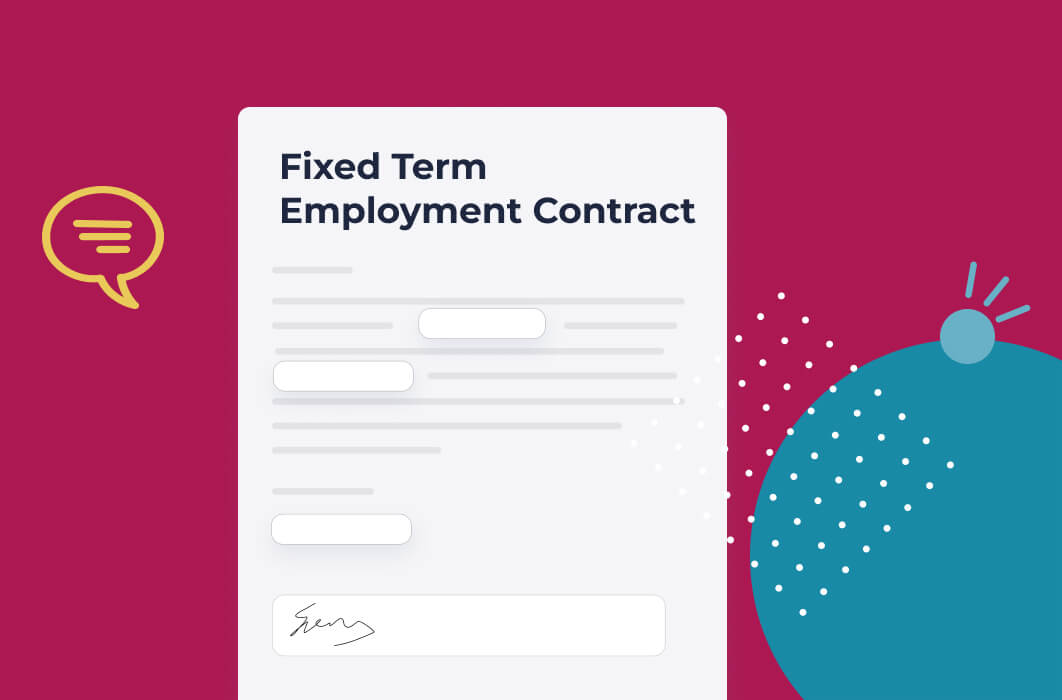The new rules on the use of fixed term employment contracts in Australia will start on 6 December 2023.
The changes are designed to prevent fixed term contracts from being used for more than two years and to limit the use of rolling fixed term contracts to one renewal.
We appreciate the original authors of this article; Worknice partner Source Services
Included in this article
- What fixed term contracts will be considered unlawful?
- New limits on rolling fixed term contracts
- What happens if a fixed term contract breaches new rules?
- Types of fixed term contracts impacted
- Exceptions to the latest rules for fixed term contracts
- Fixed term contracts entered into before & after 6 December 2023
- Fixed Term Contract Information Statement
- Anti-avoidance measures
What fixed term contracts will be considered unlawful
From 6 December 2023, it will be unlawful to enter into a contract of employment that:
- has a fixed term of more than two years;
- has a fixed term that may be extended or renewed so that the total period is more than two years; or
- has a right to extend or renew the contract more than once.
New limits on rolling fixed term contracts
If a fixed term contract has been in place, it will be unlawful to enter into another fixed term contract if:
- the total period of the previous contract and the new contract is more than two years;
- there have already been two fixed term contracts;
- the new contract has an option for renewal or extension; or
- the previous contract had an option for extension that has been exercised.
For these rules to apply, there needs to be sufficient connection between the rolling fixed term contracts. This will be the case if:
- the previous contract was for the employee to perform the same, or substantially similar, work as the employee is required to perform under the new contract; and
- there is a substantial continuity of the employment relationship between the employer and the employee in the period between the previous contract terminating and the new contract coming into effect.
What happens if a fixed term contract breaches new rules?
If an employer enters into a fixed term contract in breach of these rules, the fixed term will have no effect and the contract will be taken to be ongoing with no end date. All other terms of the contract will continue to apply.
Types of fixed term contracts impacted
These rules apply whether the contract is a “true” fixed term contract or a maximum term contract. A “true” fixed term contract has an end date with no right to terminate before that date. A maximum term contract has an end date, but also gives one or more parties a right to terminate before the end date.
The rules also apply to contracts for a specified period of time, for a specified task or for the duration of a specified season.
Casual employees
These rules do not apply to casual employees.
Exceptions to the latest rules for fixed term contracts
There are a number of exceptions to these rules, which are as follows:
- the employee is engaged under a contract:
a. to perform a distinct and identifiable task involving specialised skills;
b. in relation to a training arrangement;
c. to undertake work during a peak demand period;
d. to undertake work during emergency circumstances; or
e. to undertake work during a temporary absence of another employee;
- in the year that the contract is entered into the employee’s earnings under the contract are above the high-income threshold. This is currently $167,500 per annum (pro-rated for part-time employees);
- the fixed term contract is permitted under an award that covers the employee;
- the contract relates to a position for the performance of work that is funded in whole or in part by government funding payable for more than two years and there are no reasonable prospects that the funding will be renewed after the end of that period; or
- the contract relates to a governance position that has a time limit under the governing rules of a corporation or association of persons.
The employer has the onus of proving that a relevant exception applies.
Fixed term contracts entered into before 6 December 2023
The new rules do not commence until 6 December 2023, which means that any fixed term contract entered into before 6 December 2023 will not be subject to the new rules. For example, a fixed term contract entered into on 20 September 2023 for three years will not be prohibited.
Fixed term contracts entered into after 6 December 2023
Any new or rolling fixed term contract entered into after 6 December 2023 will be subject to the new rules. Any previous fixed term contract will be counted toward the two-year limitation or limitation on more than one renewal for rolling fixed term contracts, even if it was in place before 6 December 2023.
Fixed Term Contract Information Statement
From 6 December 2023, employers will need to provide a Fixed Term Contract Information Statement to each employee entering into a fixed term contract.
Anti-avoidance measures
There will be anti-avoidance measures in place to prevent employers from taking certain actions to avoid the new rules. Employers are cannot do any of the following if the reason for doing so includes avoiding the new rules:
- terminating the employee’s employment for a period;
- delaying re-engaging the employee for a period;
- not re-engaging the employee and instead engaging another employee to perform the same, or substantially similar, work;
- changing the nature of the work or tasks the employee is required to perform; or
- otherwise altering the employment relationship.
Workplace rights
The new rules are considered workplace rights for the purpose of the general protections provisions in the Fair Work Act. This means an employer is prohibited from taking adverse action against an employee because of these rights.
Penalties for employers
If an employer contravenes these provisions, they will be at risk of civil penalties of up to $93,900 for a corporation, and $18,780 for individuals.
Where to from here?
We suggest that employers take the following steps:
- Review any fixed term employment contract arrangements currently in place. Where needed, renew any that expire before 6 December 2023, and start planning for any that will come up for renewal after 6 December 2023.
- Review employment contract templates to ensure they do not contain any terms that are inconsistent with the new rules.
- When a fixed term contract is due for renewal, ensure that the renewal of the employee’s contract does not breach the new rules. Use technology like Worknice to ensure compliance and streamline this process.
- Provide training about the new provisions to hiring managers who use fixed term contracts.
- Keep an eye out for the new Fixed Term Contract Information Statement and provide this to employees entering into a fixed term contract after 6 December 2023.
- Speak to a professional HR services business, such as Source Services in Sydney, if you have any queries about the new rules as this area is evolving and we expect to see case law about how they will apply.
Ensure contract compliance with Worknice
Worknice helps you to automate contract compliance and streamline the process of issuing new contracts to new and existing employees. Find out more today.



